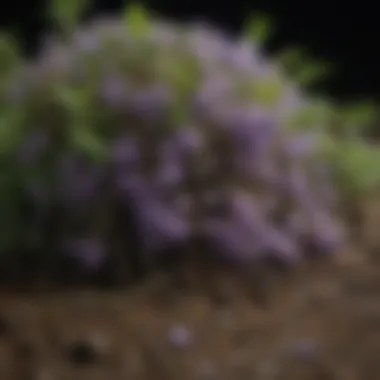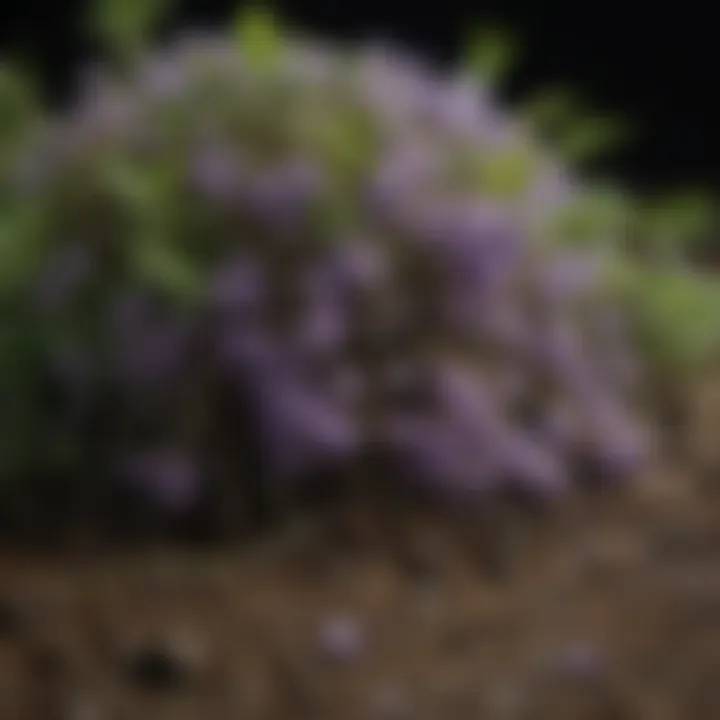Exploring Valerian Root, Hops, and Passion Flower for Mental Health


Intro
The exploration of mental health has garnered substantial attention in recent years. As society becomes increasingly aware of the importance of mental well-being, the demand for natural remedies has risen. Among these remedies, valerian root, hops, and passion flower stand out. Each of these botanical ingredients possesses unique properties that offer potential benefits for mental health. Understanding how they work together can be beneficial for those seeking alternatives to conventional treatments.
Understanding Mental Health and Well-being
What is Mental Health?
Mental health encompasses emotional, psychological, and social well-being. It affects how individuals think, feel, and behave in everyday life. Mental health is crucial at every stage of life, from childhood through adulthood.
The Importance of Prioritizing Mental Well-being
Prioritizing mental well-being is essential for achieving a balanced life. Good mental health enhances our ability to lead fulfilling lives, maintain healthy relationships, and cope with stress. "Our state of mind influences our physical health as well, with documented effects on physical disorders connected to stress and anxiety."
Common Mental Health Challenges and Disorders
Many individuals face mental health challenges, which can include:
- Anxiety disorders
- Depression
- Stress-related disorders
- Mood disorders
These conditions can disrupt daily activities and quality of life, making it crucial to explore potential avenues for support and healing.
Strategies for Improving Mental Health
Self-care Techniques and Practices
Practicing self-care is a cornerstone of improved mental health. Effective techniques include:
- Regular physical activity
- Adequate sleep
- Healthy nutrition
- Mindfulness practices
Each of these elements contributes to a healthier state of mind.
Building Resilience and Stress Management
Resilience refers to the ability to bounce back from challenges. Building resilience can be enhanced through:
- Problem-solving skills
- Emotional regulation
- Positive self-talk
Managing stress is key to maintaining mental health. Regularly engaging in relaxation techniques can do wonders for mental stability.
Seeking Professional Help: Therapy and Counseling
Engaging with a mental health professional can provide valuable insight and tools for coping with mental health issues. Therapy offers tailored support to those seeking to enhance their well-being.
Finding Balance in Life
Healthy Lifestyle Choices: Diet, Exercise, and Sleep
A well-rounded lifestyle promotes mental health. This includes:
- Nutritious foods rich in Omega-3 fatty acids, vitamins, and minerals.
- Regular exercise, which releases endorphins, enhancing mood.
- Sufficient sleep, allowing the brain to recharge.
Mindfulness and Meditation Practices
Mindfulness and meditation are effective tools for enhancing focus and reducing anxiety. Incorporating these practices into daily routines can facilitate greater self-awareness and calmness.
Setting Boundaries and Managing Time Effectively
Setting clear boundaries in personal and professional life can prevent overwhelm. Effective time management techniques can also reduce stress and promote a healthier work-life balance.
Enhancing Personal Development
Goal Setting and Productivity Tips
Setting realistic goals can provide direction and motivation. Employing techniques like the SMART criteria can aid in developing clear and manageable objectives.
Building Healthy Relationships and Social Connections
Healthy relationships play a significant role in mental well-being. Fostering genuine connections with others provides support and enhances feelings of belonging and acceptance.
Practicing Gratitude and Positivity
Cultivating gratitude can transform perspective. Regularly reflecting on positive aspects of life encourages a more optimistic outlook, which can be beneficial for overall mental health.
Tips for Maintaining Mental Well-being
Strategies for Preventing Burnout
Preventing burnout is crucial. Strategies include:
- Taking regular breaks
- Engaging in hobbies
- Seeking social support
Coping with Challenges and Setbacks
Life presents challenges. Developing coping mechanisms such as engaging in physical activity, journaling, or talking with friends can be advantageous in managing setbacks.


Creating a Supportive Environment
A supportive environment promotes mental health. Surrounding oneself with positive influences and reducing exposure to negativity can significantly uplift mental state.
"The integration of natural remedies, like valerian root, hops, and passion flower, may complement these strategies, offering additional pathways to mental wellness."
By understanding the association between these botanicals and mental health, readers can explore safe and natural approaches to enhancing their well-being. Determining how each element contributes individually and in combination is a step towards informed decisions regarding mental health care.
Preamble to Mental Health and Natural Remedies
Mental health is an increasingly pressing issue in contemporary society. The growing awareness of mental well-being has prompted individuals to seek solutions that align more closely with their values and preferences. With this shift, natural remedies have gained attention as potential alternatives to conventional treatment options. The intersection of nature and mental health offers both promise and complexity.
Natural remedies such as valerian root, hops, and passion flower are not new. They have been used for centuries in different cultures. This article aims to explore their synergistic effects on mental health, which is an area of interest for many.
Emerging Trends in Mental Health Treatment
One major trend in modern mental health care is the increasing inclination towards integrative and complementary therapies. A growing body of research indicates that patients often prefer a blend of traditional medicine and natural alternatives. As people seek holistic interventions, there is a corresponding rise in discussions around how botanicals can aid in treating anxiety and sleep disorders. Integrative practices can enhance the efficacy of standard medications, leading to improved outcomes.
Recent studies have shown that combining traditional approaches with natural remedies can bolster treatment compliance and patient satisfaction. Whether it is through mindfulness practices, exercise, or the inclusion of botanicals, these emerging trends underline a shift towards a more inclusive approach to mental health.
The Importance of Holistic Approaches
Holistic health emphasizes the connection between the mind and body, ensuring that treatment covers all aspects of a patient’s life. This approach is invaluable, particularly in mental health, where emotional, psychological, and physical well-being are deeply intertwined.
Incorporating natural remedies into treatment plans addresses not only the symptoms but also supports overall well-being. Valerian root, hops, and passion flower particularly stand out due to their calming properties and potential to support sleep quality. Using these plants can contribute to a more thorough approach, reducing the risk of over-reliance on pharmaceuticals. While each person’s experiences with mental health can vary significantly, engaging with these holistic options offers paths towards restoration and balance.
"Natural remedies have stood the test of time, proving to be significant allies in the quest for mental wellness."
This examination of natural alternatives contributes to understanding how they interplay with established treatments. Readers will gain insight into effective solutions that bridge ancient practices with modern needs.
Valerian Root: An Overview
Valerian root, derived from the Valeriana officinalis plant, has been utilized for centuries for its calming properties. It is gaining recognition in modern wellness circles, owing to its potential benefits for mental health, particularly in alleviating anxiety and enhancing sleep quality. Understanding valerian root's pharmacological profile is crucial as it highlights the specific components contributing to its effects. This section will explore its historical uses, the compounds that constitute valerian, and how these components interact with the nervous system.
Historical Use in Traditional Medicine
Historically, valerian root has been applied in various traditional medicine systems across the globe. Ancient Greeks and Romans recognized its soothing effects, often using it as a remedy for insomnia and anxiety. Traditional Chinese medicine also incorporated valerian for similar purposes, reflecting its long-standing role in health practices.
In Europe, during the Middle Ages, it became favored as a natural treatment for emotional disturbances, predominantly due to its sedative effects. This historical reliance showcases valerian root's acceptance and trust among diverse cultures, which contributes to its current popularity as a natural remedy for mental health.
Chemical Composition and Active Compounds
The efficacy of valerian root can be attributed to its complex chemical composition. It contains various active compounds including valerenic acid, isovalerenic acid, and a range of flavonoids and essential oils. These constituents are theorized to contribute to its sedative and anxiolytic properties.
Valerenic acid is particularly noteworthy as it appears to have a key role in modulating GABA receptors in the brain. This action could potentially enhance the calming effects of valerian root, making it a fitting option for those dealing with stress or sleep issues. Additionally, the unique blend of essential oils in valerian may provide peripheral effects that complement the primary active ingredients, enhancing overall efficacy.
Physiological Effects on the Nervous System
Valerian root interacts with the central nervous system, leading to notable physiological effects. Studies suggest that it may promote relaxation and improve sleep quality by influencing neurotransmitter activity, particularly GABA, which is often linked to promoting relaxation in the brain.
Valerian appears to exhibit sedative properties through its effects on GABAergic transmission, contributing to its status as a prevalent natural remedy for anxiety and insomnia.
Moreover, its potential to reduce physiological markers of stress, such as elevated heart rate, has been documented, suggesting that it may aid in gradually improving not only mental well-being but also overall physical responses to stress. Understanding these mechanisms offers valuable insights for individuals considering valerian root as part of their mental health strategies.
Hops: Beyond the Brewery
Hops, primarily recognized for their role in brewing beer, possess attributes that extend well beyond this familiar use. In the context of mental health, they have garnered increasing attention for their potential to alleviate sleep disorders and anxiety. This section will explore their traditional applications, active ingredients, and emerging psychoactive properties, lending insight into how hops can serve as a natural remedy in managing mental health issues.
Traditional Applications in Sleep and Anxiety
Historically, hops have been utilized in various folk remedies aimed at treating insomnia and anxiety. Their calming effect is often attributed to their sedative properties. People have consumed hop-infused teas, tinctures, or even added hops to pillows to promote restful sleep.
The potential of hops to aid in sleep is rooted in its influence on the body’s neurotransmitter system. Studies observe that extracts from hops can enhance sleep quality. This attribute is especially relevant for individuals struggling with recurring sleep disturbances or anxiety disorders. The relaxing impact of hops contributes positively to mental health by fostering better sleep, which is critical for emotional regulation and overall wellbeing.
Active Ingredients and Their Actions
The therapeutic effects of hops can be traced to several bioactive compounds, notably humulone and lupulone. These compounds interact with the body in several ways:
- Sedative Effects: They may enhance sleepiness and reduce restlessness by modulating GABA receptors.
- Mood Regulation: Hops can have an anxiolytic effect, easing feelings of anxiety.
- Antioxidant Properties: They contribute to overall health by combating oxidative stress, which is often linked to mental health issues.
Research indicates that these active ingredients can promote relaxation without significant side effects. This makes hops a valued option for those seeking natural remedies for mental health challenges.
Exploration of Psychoactive Properties
The psychoactive properties of hops are gaining traction in scientific discourse. Emerging studies suggest that hops may possess mild psychoactive effects, differentiating them from traditional herbal remedies. This quality is mainly attributed to their influence on neurotransmitter activity, which affects mood and anxiety levels.
- Some clinical observations indicate that compounds in hops can enhance the efficacy of sedative medications, offering a complementary approach for individuals undergoing treatment for anxiety and sleep disorders.
- Additionally, the interaction of hops with other botanicals, such as valerian root and passion flower, symbolizes promising avenues for innovations in mental health therapies.
Passion Flower: A Comprehensive Insight
Passion flower, known scientifically as Passiflora incarnata, has garnered significant attention in the field of mental health. It is recognized for its calming properties, making it a candidate for those seeking natural remedies to address anxiety and sleep disorders. Understanding its cultural significance, biochemical composition, and effects on mood and sleep patterns provides valuable insights into how it may contribute positively to mental well-being.
Cultural Significance and Usage
Historically, passion flower has been embraced by various cultures, particularly among Native American tribes. They traditionally used this herb for its soothing qualities, applying it to treat nerve-related issues and to facilitate sleep. In modern herbal medicine, its reputation as a natural anxiolytic has continued. It is commonly found in herbal teas and tinctures and is often combined with other calming herbs to enhance its effects.
The role of passion flower is not just limited to traditional lore. Various studies suggest its efficacy in reducing anxiety and improving sleep quality. Users often report feeling more relaxed and less stressed when incorporating it into their daily routine.


Biochemical Makeup and Therapeutic Potential
The therapeutic properties of passion flower can be attributed to its unique biochemical makeup. Key constituents include flavonoids, glycosides, and alkaloids. These active compounds interact with the neurotransmitter gamma-aminobutyric acid (GABA) in the brain. GABA is known for its inhibitory action, which helps calm the nervous system and alleviate feelings of anxiety.
In addition to GABA modulation, passion flower contains other bioactive compounds that may contribute to its therapeutic potential. For example, harmane, an alkaloid found in passion flower, has shown promise in promoting relaxation and improving mood. Such biochemical interactions underscore the importance of this plant in mental health treatment.
Effects on Mood and Sleep Patterns
Research indicates that passion flower can be effective in enhancing sleep quality and stabilizing mood. Many individuals who struggle with insomnia have reported that consuming passion flower before bedtime leads to a more restful sleep and shorter sleep onset latency.
Moreover, passion flower's calming effects extend to mood improvement. It has the potential to elevate serotonin levels, a neurotransmitter closely tied to mood regulation. This dual action on sleep and mood makes passion flower a compelling option for those looking to improve their overall mental health.
Passion flower’s versatility is evident as it can be used in various forms, including capsules, teas, and tinctures. Each method of consumption allows for personalized usage depending on individual preferences and needs.
"Incorporating passion flower into a daily regimen may provide a gentle means of enhancing mental well-being, proving beneficial for individuals susceptible to stress and anxiety."
In summary, passion flower is an important component in the realm of natural remedies for mental health. Its historical relevance, biochemical properties, and positive effects on mood and sleep highlight its potential as a valuable ally in holistic mental health approaches.
Mechanisms of Action: How These Botanicals Work
Understanding the mechanisms of action of valerian root, hops, and passion flower is crucial to appreciate their roles in mental health. These botanicals do not merely offer subjective benefits; their effects can be traced back to specific biochemical interactions within the body. Knowledge about how these plants function enhances the effectiveness of their application, guiding users toward a more informed utilization in promoting mental wellness.
Interaction with Neurotransmitters
The interaction with neurotransmitters is central to how valerian root, hops, and passion flower exhibit their calming and anxiolytic effects. Neurotransmitters are chemical messengers that transmit signals in the nervous system. Valerian root contains compounds like valerenic acid, which can increase the availability of gamma-aminobutyric acid (GABA) in the brain. GABA plays a primary role in reducing neuronal excitability, thus promoting relaxation and reducing anxiety.
Similarly, hops contain the active compound humulone, which may further enhance the GABAergic system, providing a compound effect when combined with valerian root. Passion flower also influences GABA levels and is thought to inhibit the reuptake of certain neurotransmitters, ensuring prolonged action.
Key interactions include:
- Increased GABA activity leading to reduced anxiety levels.
- Modulation of serotonin and dopamine, contributing to mood stability.
- Synergistic effects via combined use enhancing overall neurotransmitter balance.
Influence on the Central Nervous System
The central nervous system (CNS) is significantly impacted by these botanicals through their biochemical actions on neurotransmitter pathways. Hops, valerian, and passion flower are known to possess mild sedative effects, making them useful in addressing issues like insomnia and anxiety.
- Valerian root primarily acts as a sedative, promoting sleep without the grogginess often associated with pharmaceutical sedatives. Its positive impact on sleep quality can be attributed to its influence on the sleep cycle.
- Hops have a dual role, where they can help maintain the balance between alertness and calmness, beneficial for individuals with racing thoughts. Research shows that the compounds in hops can reduce sleep latency, assisting in a quicker transition to sleep.
- Passion flower acts as a calming agent, reducing activity in the brain which aids in preventing overthinking at night.
These botanicals uniquely influence neurophysiological states, making them essential allies for individuals seeking natural ways to optimize their mental health. Integrating these plants into daily routines can enhance both mood and cognitive function, paving the way for a holistic approach to mental wellness.
Synergy Among Valerian Root, Hops, and Passion Flower
The integration of valerian root, hops, and passion flower offers significant implications for improving mental health. Each of these botanicals has been studied for its individual effects on anxiety and sleep disorders, but when combined, their synergistic properties could enhance overall efficacy. This synergy is particularly noteworthy, as it leverages the unique mechanisms of action of each herb to create a more robust response against mental health challenges.
Among the many benefits observed in this triad, the most compelling lie in their complementary roles in stress management and sleep enhancement. Research suggests that while valerian root primarily targets sleep issues through its sedative effects, hops contribute a calming influence that may further reduce anxiety. Passion flower, with its ability to modulate stress responses, rounds out this blend, making it invaluable for those seeking holistic mental health solutions.
Despite the promise these botanicals hold, it is essential to consider factors such as dosage, individual health conditions, and possible interactions with other medications. Understanding how these elements interplay can elevate the effectiveness of their combined use, ensuring safety and maximizing benefit.
The potential benefits of combining valerian root, hops, and passion flower are supported by their unique phytochemical properties, which collectively address various aspects of mental well-being.
Complementary Effects on Stress Reduction
Valerian root, hops, and passion flower each have distinctive pathways through which they can effectively reduce stress levels. Valerian root is known for its role as a natural sedative, often recommended for individuals experiencing insomnia and anxiety. The active compounds, including valerenic acid, work by increasing gamma-aminobutyric acid (GABA) availability in the brain, assisting in lowering stress responses. Hops, traditionally recognized for their use in brewing, have mild sedative properties attributed to compounds such as humulone. This characteristic can help induce a sense of calm and relaxation, which is vital in stress reduction.
Similarly, passion flower exhibits a unique ability to alter stress-related behaviors. Its primary constituents, like passiflorine, have been shown to reduce anxiety by enhancing GABA activity, which mirrors the effects of valerian root. Together, the combination of these three botanicals can effectively create a multi-faceted approach to stress relief.
- Benefits of Combined Stress Reduction:
- Prolonged relaxation response
- Enhanced emotional stability
- Support for cognitive function during stress
In sum, the adjunctive effects of valerian root, hops, and passion flower demonstrate profound potential in alleviating stress-related symptoms. Their combined usage may lead to improved overall mental health by addressing the physiological and psychological aspects of stress.
Combined Impact on Sleep Quality
The combination of valerian root, hops, and passion flower represents a unique approach to improving sleep quality. Many people struggle with sleep disorders related to anxiety and stress. Valerian root has gained prominence for its sleep-promoting effects. Clinical studies have indicated that it can decrease the time it takes to fall asleep and enhance sleep duration. Hops, while primarily associated with beer, also have a relaxing effect that can induce sleep. This makes them a perfect companion to valerian root.
Passion flower additionally enhances sleep quality by alleviating anxiety and promoting a tranquil state of mind, encouraging easier transitions into sleep. This dual method of supporting both the anxiety component and sleep aspect provides a comprehensive approach to sleep issues.
- Key Benefits of this Formulation:
- Faster onset of sleep
- Improved sleep cycles
- Reduced nighttime awakenings
This combination not only improves the quality of sleep but can also transform the overall mental well-being of individuals relying on these natural remedies.
Practical Applications: Utilizing These Botanicals
The practical applications of valerian root, hops, and passion flower are significant in the context of mental health. These botanicals are not just theoretical remedies; they offer tangible benefits that can enhance well-being when correctly utilized. Understanding their formulations, dosages, and best practices is essential for those seeking to incorporate these natural solutions into their mental health strategies.
When considering the use of these herbs, it's important to reflect on how they can work together. Many individuals are looking for alternative solutions for anxiety, sleep disturbances, and overall mental wellness. Here, we will outline the practical aspects of using these botanicals, paying attention to the specifics that make their applications effective and safe.
Formulations and Preparations
Valerian root, hops, and passion flower have been utilized in various formulations. These include teas, extracts, capsules, and tinctures. Each preparation method affects the potency and absorption of the active compounds.
- Teas: Combining these herbs in a tea form provides a gentle introduction. Ususally, a ratio mixing dried valerian root, hops flowers, and passion flower can bring out their effects gradually. Brewing should typically last around 10 minutes, allowing the flavors and constituents to infuse well.
- Extracts and Tinctures: Alcohol-based tinctures offer a more concentrated dose. They require smaller amounts for efficacy. A dropper full usually suffices for one serving.
- Capsules: For those who prefer convenience, pre-measured capsules are available but ensure they contain quality extracts.


Formulations can be tailored according to personal preferences and desired effects. It is important to source high-quality products to maximize benefits and minimize potential side effects.
Dosage Recommendations and Guidelines
Determining the appropriate dosage is crucial. Individual responses can vary based on body chemistry, current medications, and overall health status.
- Valerian Root: The typical dosage ranges from 300 mg to 600 mg per day, taken about an hour before bed for sleep enhancement.
- Hops: A standard dose can be around 250 mg to 500 mg, which can be taken in combination with valerian root for greater relaxation effects.
- Passion Flower: Generally, 200 mg to 400 mg is effective when needed to manage anxiety or restlessness.
It’s advisable to start with lower doses and monitor effects. Adjust as needed, ensuring that the combined dosages do not exceed recommended amounts.
Best Practices for Usage
Employing best practices enhances the safety and efficacy of using valerian root, hops, and passion flower. Here are some guidelines:
- Consult a healthcare provider: Particularly if you are pregnant, breastfeeding, or on medication, professional guidance can prevent adverse interactions.
- Consistency: Engage in regular usage to gauge the potential benefits. Often, a cumulative effect is observed in herbal applications.
- Awareness of Timing: Understand when to take these supplements. Evening doses are beneficial for sleep, while daytime intakes may help with anxiety management.
- Personal Monitoring: Keep a diary to track effects, symptoms, and any side effects experienced over time. This can facilitate discussions with health professionals.
As interest in natural remedies grows, understanding how to use these botanicals effectively is crucial for achieving desired health outcomes.
By following these practical applications, one can harness the benefits of valerian root, hops, and passion flower. This holistic approach, when utilized properly, can contribute significantly to improved mental well-being.
Potential Side Effects and Considerations
Understanding the potential side effects and considerations of using valerian root, hops, and passion flower is essential in ensuring a safe and effective approach to mental health management. While these botanicals are often lauded for their calming and stress-reducing properties, they may also produce unforeseen reactions in some individuals. Therefore, it is vital to explore the common adverse reactions and identify specific populations who may need to exercise caution.
Common Adverse Reactions
The use of valerian root, hops, and passion flower may be associated with several common adverse reactions. These reactions can vary depending on the individual and the form in which these herbs are consumed.
- Drowsiness is a typical effect, especially if taken in higher doses or combined with other sedative medications. Users may find this beneficial, but caution is advised when driving or operating machinery.
- Gastrointestinal discomfort, including nausea and stomach cramps, is another possible side effect. Individuals may experience these symptoms after consumption, particularly when taken on an empty stomach.
- Allergic reactions can also occur. Symptoms may include rash, itching, or difficulty breathing. It is crucial for individuals with known sensitivities to herbal supplements to monitor their reactions closely.
- Headaches and dry mouth have been reported as well. Hydration and dosage adjustment may mitigate these effects.
Patients should consider any underlying health conditions that might exacerbate these reactions.
"Awareness of potential side effects is crucial for managing health safely, especially when integrating natural remedies into treatment plans."
Patient Populations to Exercise Caution
Certain patient populations should approach the use of these botanicals with care. Here are some key groups to consider:
- Pregnant and breastfeeding women: The effects of valerian root, hops, and passion flower during pregnancy and lactation are not well-studied. Hence, it is recommended to avoid these herbs unless prescribed by a healthcare provider.
- Individuals on sedative medications: Those taking prescription medications for anxiety, depression, or sleep disorders may experience compounded effects when using these botanicals. Consultation with a healthcare professional is advised.
- People with compromised liver function: Metabolism of these herbal ingredients can be affected in individuals with liver diseases. Monitoring by a healthcare provider is essential.
- Children and adolescents: The use of these herbs in young populations is not thoroughly studied. Appropriate medical guidance is vital.
It feels necessary to highlight that components of natural remedies can interact with other medications or existing health conditions. Therefore, individuals interested in these herbs should consult with a knowledgeable healthcare professional before beginning any regimen that includes valerian root, hops, or passion flower.
Current Research and Future Directions
Research in the area of natural remedies for mental health continues to evolve. The exploration of valerian root, hops, and passion flower offers promising insights into their benefits and applications. Scientific inquiry has sharpened its focus on these botanicals, aiming to understand their synergistic effects and mechanisms of action. This section will delve into important clinical studies and innovative approaches in botanical integrations, underscoring the relevance of ongoing research as a vital component of our understanding of these plant-based remedies.
Clinical Studies and Findings
Numerous clinical studies have investigated the mental health benefits of valerian root, hops, and passion flower. For example, valerian root has been studied for its anxiolytic properties. One prominent study indicated that participants who took valerian experienced significant improvements in anxiety levels compared to those receiving a placebo. Similarly, hops have shown effectiveness in supporting sleep quality, which is crucial for mental health. A review of clinical trials found that adults using hops saw enhancements in sleep duration and satisfaction.
Passion flower also presents noteworthy findings. Research has indicated its potential in easing anxiety symptoms, comparable to traditional pharmaceuticals in certain cases.
The combination of these botanicals should not be overlooked. Some trials examining the effects of combined formulations have revealed complementary benefits, enhancing the potency and efficiency of individual substances. For example, one study suggested that a mixture of valerian, hops, and passion flower leads to superior outcomes in sleep quality and stress reduction than any single herb.
Innovations in Botanical Integrations
The future of mental health treatment may lie in innovative integrations of traditional remedies. Progressive research is underway to harness the collective benefits of valerian root, hops, and passion flower through creative formulations.
Research teams are developing combination supplements that precisely balance the active components of these herbs. This approach ensures optimal efficacy while minimizing side effects. Clinical trials are increasingly prioritizing these formulations, aiming to validate their use in clinical practices.
Moreover, technological advancements in extraction and formulation methods offer new possibilities. Techniques such as standardized extracts and nanotechnology may enhance bioavailability of the active compounds, further maximizing their therapeutic potential.
The blend of science with traditional knowledge holds great promise for the future of mental health treatments involving botanicals.
Furthermore, researchers are focusing on personalized medicine, tailoring the dosage and composition of these herbal combinations to suit individual needs. As more studies emerge, a clearer picture will develop about how these botanicals work synergistically in diverse patient populations.
Finales and Final Thoughts
The exploration of valerian root, hops, and passion flower reveals much about how natural remedies can enhance mental health. By diving into their unique properties, we can see clear benefits that make them valuable in managing anxiety, improving sleep, and promoting general well-being. The significance of the synergistic potential of these botanicals in mental health cannot be understated. Each ingredient brings different yet complementary qualities to the table, significantly enhancing their overall efficacy.
Understanding how these plants work together is essential. The unique chemical compositions of valerian root, hops, and passion flower allow them to influence neurotransmitter activity and interact with the central nervous system. This interplay is what often leads to improved mood and relaxation, essential for those dealing with mental health challenges.
Moreover, practical considerations, such as the proper dosage and potential side effects, are critical when considering their use. It is essential to move forward with this knowledge, ensuring we do so in a responsible manner. Education on the applications of these botanicals helps individuals make informed choices about their mental health strategies.
"Natural remedies like valerian root, hops, and passion flower can play an important role in mental health, but understanding their use is key to maximizing their benefits."
Synthesis of Findings
The timely journey through the potential of valerian root, hops, and passion flower highlights their historical significance and modern applications. Studies suggest that these botanicals can reduce stress and improve sleep quality, addressing core issues in mental health management.
- Valerian root offers sedative properties, primarily benefitting those with insomnia.
- Hops contribute a calming effect conducive to relaxation, tied closely to sleep and anxiety relief.
- Passion flower stands out for its ability to alleviate anxiety and facilitate mood stabilization.
These findings collectively suggest that while each botanical serves a unique role, their combined efforts may amplify their benefits. Recognizing this synergy points toward the effective integration of these natural remedies into holistic mental health strategies.
Call for Further Exploration
The findings presented in this article open the door to future research avenues. Investigating the specific mechanisms through which these botanicals operate can provide deeper insight into their effectiveness. Possible avenues of exploration include:
- Conducting clinical trials to assess the combined effects of these remedies and their efficacy across diverse populations.
- Examining the long-term benefits and any potential risks associated with prolonged use.
- Exploring potential drug interactions with commonly prescribed medications for mental health.
Incorporating more extensive research can enhance understanding and encourage practitioners to utilize these natural adjuncts to standard treatments. There is high potential for developing innovative formulations that incorporate these ingredients, which could broaden acceptance and accessibility in mental health care.
Encouraging open discussions in academic and clinical settings about these botanicals will also promote their usage and understanding, making their benefits known among those who seek mental health solutions.















